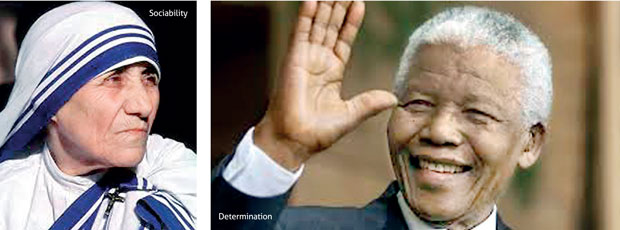Reply To:
Name - Reply Comment

.jpg)
Trait theory highlights the notion that traits refer to stable or consistent patterns of behavior relatively immune to situational contingencies— individuals with certain traits denoting particular behavioral predispositions would react in similar ways across a variety of situations having functionally diverse behavioral requirements.
It affirms that there are certain identifiable traits that are unique to leaders and all good leaders possess such traits to a greater extent. Further it argues that leadership qualities or traits essentially need not be inborn but can be enhanced or acquired through learning and practice.
In the early 20th century, the trait approach generated much interest among researchers for its explanation of how traits influence leadership and individuals’ perceptions of leadership. Scholars worked on the trait approach attempted to identify several broader categories of traits including physiological (appearance, height, and weight), demographic (age, education and socioeconomic background), intellect (intelligence, decisiveness, judgment, and knowledge), task-orientation (achievement drive, initiative, and persistence), social characteristics (sociability and cooperativeness), personality, self-confidence and aggressiveness in relation to leader emergence and leadership effectiveness.
Kirkpatrick and Locke (1991) suggested that “it is unequivocally clear that leaders are not like other people.” They affirmed that leaders differ from non-leaders on six dominant traits: drive, motivation, integrity, confidence, cognitive ability, and task knowledge. It is these six traits that make up the “right stuff” for leaders. In a further study, Jung and Sosik (2006) found that charismatic leaders consistently possess traits of self-monitoring, engagement in impression management, motivation to attain social power, and motivation to attain self-actualization.
Although different research studies postulated various dominant leadership traits, there were few common elements emerged in those studies. Although these traits are not responsible solely to identify whether a person will be a successful leader or not, they are essentially seen as preconditions that endow people with leadership potential. Those are;
Integrity
Integrity is the most important leadership trait. It is the quality of honesty and trustworthiness. People who adhere to a strong set of principles and take responsibility for their actions are exhibiting integrity.
Leaders with integrity inspire confidence in others because they can be trusted to do what they say they are going to do. They are loyal, dependable, and not deceptive. Basically, integrity makes a leader believable and worthy of trust. “Integrity means, being honest to others and true to yourself.”
Intelligence
Based on the analysis of a series of recent studies on intelligence and various indices of leadership, Zaccaro (2004) found supporting evidence that leaders tend to have higher level of intelligence than non-leaders and the possibility of someone, who possess the required knowledge, skills, and attitude becoming a leader is more. Having strong verbal ability, perceptual ability, and reasoning appears to make one a better leader.
They could be more effective, strategic, operationally focused, and balanced. Although it is good to be intelligent, the research indicates that a leader’s intellectual ability should not differ too much from that of the followers.
If the leader’s IQ (intelligence quotient) is very different from that of the followers, it can have a counterproductive impact on leadership. Leaders with higher abilities may have difficulty in communicating with followers because they are preoccupied or because their ideas are too advanced for their followers to accept.
Self-confidence
This is another dominant trait that a leader should have. It is the ability to be certain about one’s competencies and skills. It includes a sense of self-esteem and self-assurance and the belief that he/she can make a difference. Leadership is all about influencing others, and self-confidence allows the leader to feel assured that his or her attempts to influence others are appropriate and right. In effect “Self –Confidence is not about thinking you are better than everybody else. It’s about not needing to compare you to anyone in the first place.”
Determination
Many leaders also exhibit self-driven strong determination. Determination is the desire to get the job done and includes characteristics such as initiative, persistence, dominance, and drive. People with determination are willing to assert themselves, are proactive, and have the capacity to persevere in the face of obstacles. Being determined includes showing dominance at times and in situations where followers need to be directed. When researching to produce an electric light bulb Thomas Alva Edison failed 999 times. He picked up from there and said “Now I know 999 ways that it will not work”. In his next attempt Edison was successful. Hence for successful leadership, “In between the possible and impossible lies Determination.”
Sociability
The last trait that is important for leaders is sociability. Sociability is a leader’s inclination to seek out pleasant social relationships. Leaders who show sociability are friendly, outgoing, courteous, tactful, and diplomatic.
They can accurately pick up on emotions in other people and understand what is really going on with them, being sensitive to their needs and show concern for their well-being. Social leaders have good interpersonal skills and create cooperative relationships with their followers. It is the leader’s ability to use self-awareness of own emotions and those of others to manage interactions successfully.
Even if we look back at present day political leadership in the country they have displayed those dominant traits to a lesser or greater extent. Past President Mahinda Rajapakse was very strong on determination and sociability which helped him to end the terrorism and to obtain masses appeal. Current Prime Minister Ranil Wickramasinghe may be stronger on intelligence and self-confidence which helped him to come into power despite a series of political defeats.
(This is the sixth article under the series of Management articles. Gamini Nanda Gunawardana B.Sc. Eng. (Hons.); M.B.A.; C.Eng.; F.I.E. (SL); M.C.S. (SL); M.I.D.P.M. (UK); F.I.A.P. (UK); M.B.C.S. (UK) Management, HR, OD & ICT Consultant, Corporate Trainer Consultant – HRD- Goodhope Asia Holdings Ltd can be contacted via E Mail: [email protected] and Skype : gamini7147)